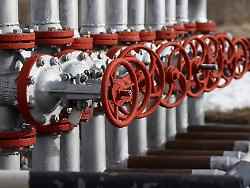“Wrong decision”
Economists don’t think much of the VAT cut
08/18/2022, 4:01 p.m
The federal government will reduce VAT on gas. Economists think that’s a mistake. This reduces the incentive to save. “Hopefully people don’t think that gas won’t get so expensive after all,” tweeted Veronika Grimm.
The temporary reduction in VAT on gas from 19 to 7 percent announced by Chancellor Olaf Scholz has met with little approval from economists. Jens Südekum, a member of the Scientific Advisory Board of the Federal Ministry of Economics, criticized that this was once again politics based on the watering can principle. It relieves many customers who do not need it. “It’s a shame that the FDP has prevailed within the traffic light coalition with the next economically highly dubious proposal. The right thing would have been: let price signals take full effect, cushioned by socially graded income transfers,” says Südekum. High earners, for whom the state is currently unable to provide relief, also benefited from the reduction. In addition, the incentives to save gas are reduced. “So exactly the opposite of what is actually needed is achieved,” said Südekum.
Rüdiger Bachmann from the US University of Notre Dame has a similar view. “This is the wrong decision, both economically and politically. There are options for relief that don’t interfere with the price mechanism,” he tweeted. Like other economists, Bachmann fears that the incentive to save gas will decrease. According to estimates by the head of the Federal Network Agency, Klaus Müller, 20 percent of gas must be saved in order to get through the fall and winter well.
That’s why the manager Veronika Grimm doesn’t think much of the reduction. “Hopefully people don’t think that gas won’t get so expensive after all,” the economist tweeted. Compared to the price increases to be expected, the move is just “a drop in the bucket.” For many, the price increases would only be noticeable in the coming year with the heating bill. Relief “to the middle of society (not just transfer recipients)” is important. Due to the reduction in VAT, however, there would now be a lack of income that could help finance the relief. “The relief would also be the prerequisite for being able to pass on the prices promptly – which would make sense with a view to GASSPAREN!”
It would have been wiser not to distort prices and pay transfers instead, Jan Schnellenbach, an economist at the Technical University in Cottbus, tweeted. “The administrative problems (bringing energy money to the pensioners, etc.) could have been solved somehow. Hopefully this isn’t a dam break for further price manipulation.”
“An interesting decision (…) that is not a good decision,” tweeted Marcel Fratzscher, President of the DIW economic research institute. For low earners, the move is better than nothing. “But it’s not a good tool because it’s expensive, not accurate and relieves people with low incomes far too little. People with high incomes and companies get the lion’s share,” tweeted the economist. A typical family of four with gas heating would be relieved by the reduction in VAT of around 500 euros per year, while the cost of gas would increase by around 3600 euros. Direct transfer payments are much better, Fratzscher suggests an “energy allowance of 100 euros per month and person for households with medium and low incomes”.
